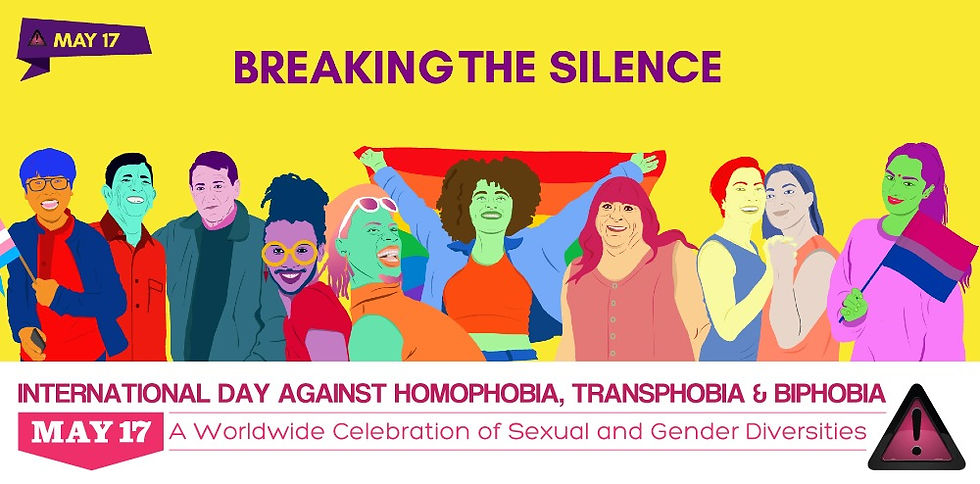International Day Against Homophobia, Transphobia, and Biphobia
- Matt Webb

- May 15, 2020
- 3 min read
Updated: Oct 17, 2020
Matt Webb explores the significance of May 17th, delving into the history of discrimination towards the LGBTQI+ community, and providing new means of celebration, as events such as pride parade have been cancelled. While the day is an opportunity to celebrate freedom of expression and uniquness of identity, it is also a chance to recognise the plight of marginalised groups across the globe, and to protest for their rights.
May 17th marks the international day against homophobia, transphobia and biphobia, and it’s safe to say the world is coming together to celebrate all kinds of love together. This year's theme is “Breaking the Silence”, and hopes to unite all LGBTQI+ individuals, both in or out of the closet. The aim is, that by uniting, less fortunate people who suffer homophobia, transphobia or biphobia, the movement will create a platform for sexual and gender diversity.

In the UK, many feel fortunate that the law is tolerant of LGBTQI+ individuals. Although there will always be individuals who don’t support the gay rights movement, the UK legalised same-sex marriage in 2014, which was a big step in the right direction. Before then, the stigma around being ‘gay’ was colossal, as homophobia, biphobia and transphobia were commonplace in society. Furthermore, ‘gay conversion therapy’ was commonly used to attempt to ‘correct’ the individual. This often meant an unhealthy amount of drugs being prescribed to them, which often led to suicides and overdoses, due to the shunning of their identity.
A well known case is that of Alan Turing: the reknowned Bletchley Park code-breaker, and the scientific mastermind behind the Bombe machine. Turing was gay, and put on high doses of medication after the Second World War, in order to try and ‘cure’ his homosexuality. In the 1950s, being gay was seen as ‘gross indecency’ by the government, and Turing was chemically castrated, causing him to take his own life in 1954.
Yet, in 2020, there are still many countries and communities that don't condone homosexuality or believe in transgender rights. For example, 10 countries in the Americas, 32 countries in Africa, 23 countries in Asia, and 7 countries in Oceania prohibit same sex relationships. whether that be between two men, two women, or both. While some efforts have been made, including Germany's recent decision to ban conversion therapy for minors, and Canada's blanket criminalisation of conversion therapy, some deeply engrained political and religious agendas still seem impossible to shift. As of June 2019, there were at least 13 countries in which homosexual relations were punishable by death; in the same month of 2019, gay marriage was legal in less than 30 of the 195 countries across the world. In 2019, at least 22 transgender or gender non-conforming individuals were killed in the USA: the vast majority of whom were black women.
While many are wondering how the 17th of May can be commemorated from inside their homes, various projects have been launched to promote the celebration and support of various identities. One recommendation is "flagging", which consists of residents hanging flags or posters in their windows, to show, not only their support, but also to offer a general salute to LGBTQI+ individuals both in the UK, and across the world. The official "May 17" website also suggests crowdfunding for LGBTQI+ charities, as members of these communities are already "part of the poorest people and are already victim of many forms of discrimination, stigma and persecution".
Other suggestions include virtual get-togethers to partake in LGBTQI+ themed-quizzes, or even a chat to offer support to those who may feel alone at this particular time. Alternatively, as many of us are beginning to realise, lockdown is the perfect opportunity for a late night netflix binge; this list provides suggestions of 50 LGBTQI+ inclusive films. Thanks to the constantly-developing technology we have access nowadays, some circles are even partaking in live and collective movie screenings.
On May the 17th, it is important to remember to "break the silence", whether that be through messaging a friend to check in with them, joining a social media campaign to support the struggle of the LGBTQI+ community in less-accepting countries, or placing a piece of political art in your window. Everyone has the power to help create a safer community for LGBTQI+ people.

#may17 #internationaldayagainsthomophobiatransphobiaandbiphobia #lgbtq #lgbt #lgbtrights #equalrights #discrimination #equality #identity #persecution #homophobia #transphobia #biphobia #inclusion #inclusivity #journalism #teenjournalism #freedomofexpression #breakingnews #culture #celebration #currentaffairs #politics #pride #prideparade #activism #activist #campaign #protest #demonstration #identity

_edited.png)



Comments